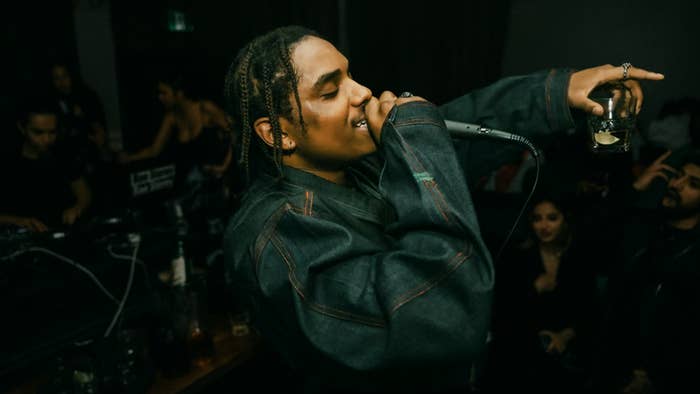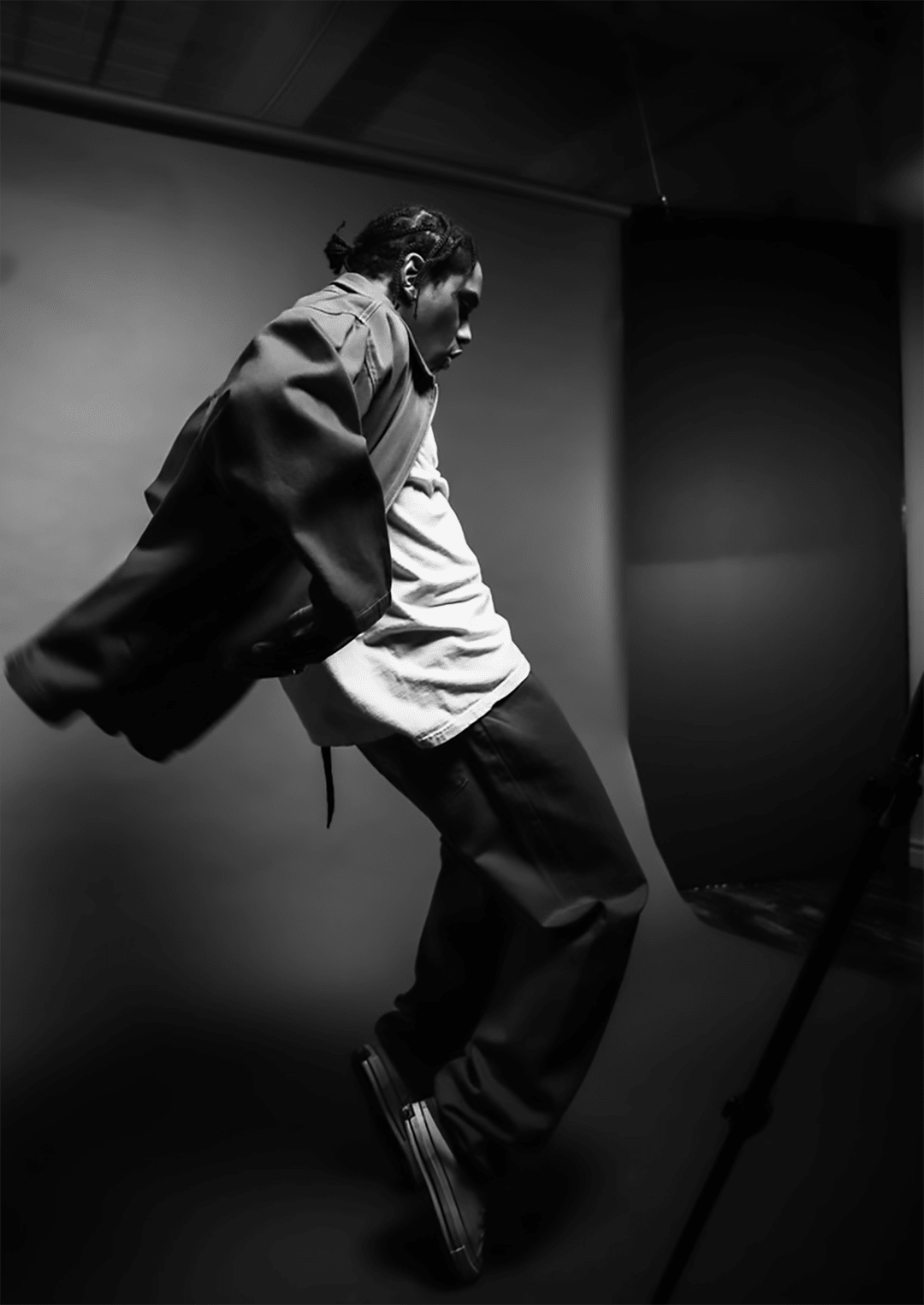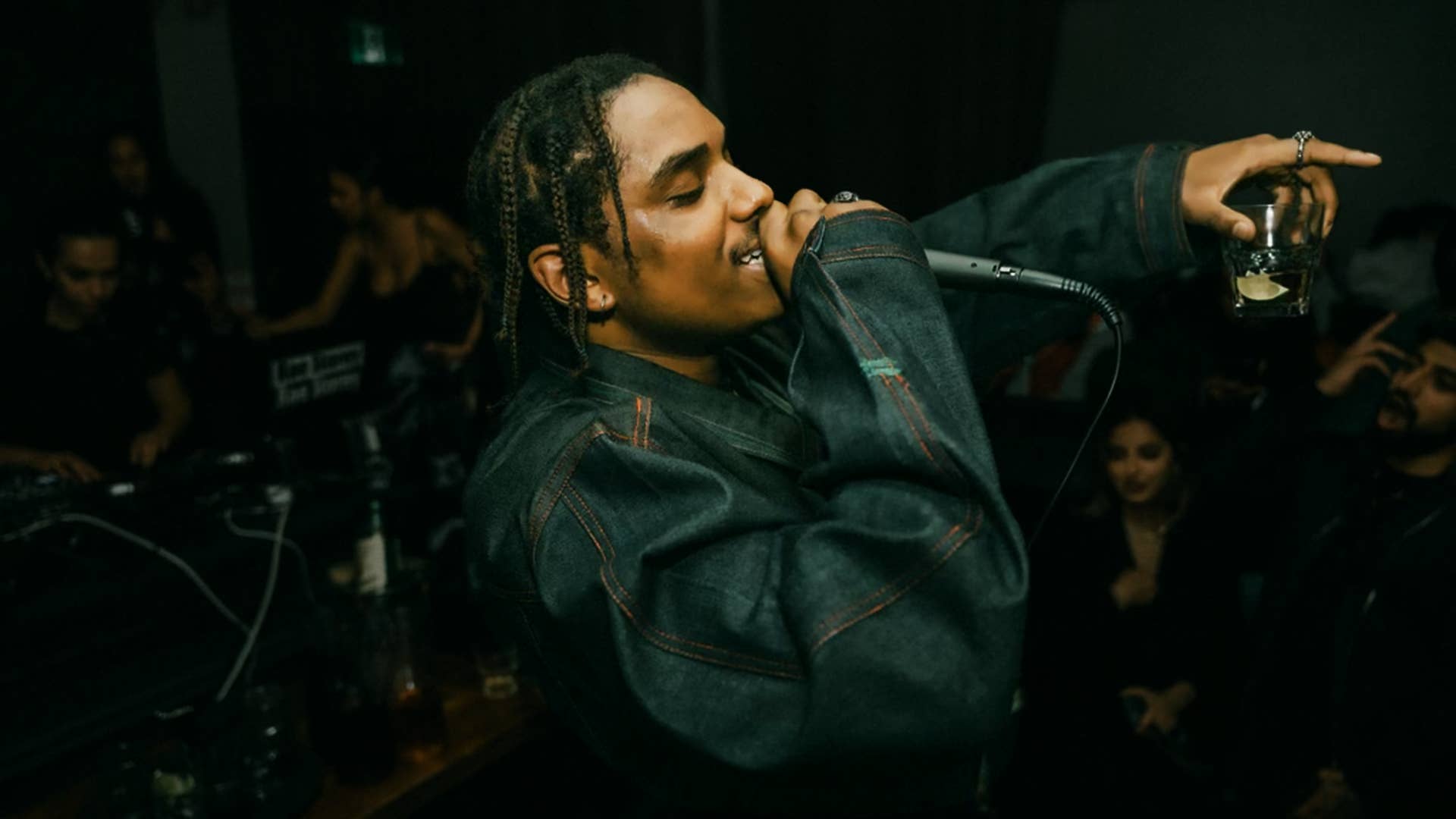
Don’t go assuming your favorite R&B singers are all wounded-hearted balladeers, wailing on the mic and penning tear-stained lyrics about unrequited pining. For Toronto R&B jack of all trades JAHKOY—who is now producing and recording as well as writing his music—joy is the modus operandi. Even on its quieter cuts, his new album Tangible maintains a grin-inducing tone along with tantalizingly raunchy lyrics. But that fun is anything but frivolous, especially considering the stifling industry politics he’s had to overcome.
Below, JAHKOY tells us about penning songs for our pleasure centers, working with a rapper that inspired him in ways that are sure to shock his R&B devotees, the renewed power of a left-for-dead music medium, and more.
What did you enjoy most about making the video for album highlight “Hot Seat”?
We shot it a few weeks ago, so I remember everything. The whole process, and everybody on set, was perfect. The stylist, Ksenia Kazantseva, went crazy with the outfits. We had amazing directors, Myfriendmekonnen and Victor Oly, who was also the videographer. We all had such a good time, it didn’t feel like work. Most times, when you’re able to just enjoy yourself the whole way through, you come out with the best product.
When you and I were kids, channels like MuchVibe were R&B kingmakers. Then it seemed like music videos became less relevant as the Internet usurped TV. But do you think social media has made videos crucial again?
Let me put it this way: I used to be very shy of cameras, and didn’t want to put my face out there. I wanted it to solely be about the music. But eventually I realized the importance of branding, and giving a full experience to the listeners. They want to see you, and buy into the experience you’re having. So, for the last two videos I put out, I wanted to invite people into my world. I know a lot of people remember me for a lot of my older stuff. But when I was working on my 404 EP [in 2019], I didn’t shoot any visuals at all, and wanted it to just be. But that rollout felt very different, especially compared to the response people are having to Tangible.
Which music video makers do you look up to most?
Justin Bieber has really good videos. They feel like short movies. Also DaBaby, because watching his videos leaves me wanting more.
Speaking of influences: how did it feel to have Fabolous, one of the biggest rappers of the 2000’s, on Tangible key track “Exes & Summer Flings”?
It could have been anybody else in the industry, and I wouldn’t have felt the same way. Because, when I started making music, I was rapping. At the time he was one of hip-hop’s prime aritsts, and from the clothes he wore to the way he pronounced things in his music, I was trying to be all that. I’d look in the mirror and recite Fabolous’ music. When he reached out to be on my song, I couldn’t believe it. Because in 2011 Fabolous and Pusha T did a cross Canada tour, and I opened for them in Toronto. I didn’t get to meet them at the time, but being able to open for them was one of my favorite things ever. I told him that recently, and he said the best part is when things come full circle.
It’s makes sense that you used to rap. Because it’s not all about singing for you on Tangible—the lyrics are just as strong. Especially on “Dizzy,” when you offhandedly mention how the woman you’re approaching hooked up with some people you know, just like how you’ve had a few rendezvous with her friends. It seemed quite sex positive and refreshing, compared to the R&B singers and rappers who have objectified women.
Yeah, it’s a very modern line. I feel like people wouldn’t necessarily talk like this a few years ago. Now, people are more comfortable and expressive, like: “I feel this way, and I shouldn’t feel bad about it.” But, I also tried to create an Usher “Same Girl” situation with it. I’m on there talking about meeting a girl in Atlanta, and my boy Lyfe Harris is singing about meeting a girl in Toronto. Then this girl, whose name is Dizzy, has got us both dizzy in each of our cities.
Does that lyricism come intuitively, or do you need to be very deliberate?
That honestly happened subconsciously. We were writing the record and the words were just flowing. Because we knew what we were trying to create. So it was one of the faster records I’ve made, I think it only took us an hour to record. We had so much fun doing it.
“I had a lot of pressure to be like Bryson Tiller or Tory Lanez. They’re great artists, but I’m not like them. Or anything close. That’s not where I want to be. And it’s not where I’m going to go.”
That’s the second time you’ve mentioned fun. So you’re not a cliched tortured artist?
It depends on the song. “Hot Seat,” for example, was so much fun. And I didn’t even record it in a studio— I did it in my cousin’s kitchen. I was working on it as a possible demo for somebody, but it was a favorite in my social circle, which made me realize how dope it was.
Now there’s nobody telling me: “You can’t make records like that.” No, I am going to make that record. And I’m going to have fun doing it. But if it isn’t intentionally a fun record, then it can sometimes be frustrating. Because you get into your feels, and those things take a toll. Especially when you’re expressing and admitting the things you’ve gone through.

But can that be rewarding in a different way?
It can. There’s been times when I’ve poured myself into a record, and I’ve had somebody tell me it saved their relationship, or did something special for them at that time. Some people enjoy how sad a song makes them. And some people love the joy of fun songs. It’s really dependent on your mood. But overall, it’s definitely rewarding to be able to express myself without limitations.
What would you tell an artist who doesn’t have that freedom and is frustrated?
Honestly, I don’t know if this is good or bad to say. But I’ll say it anyway. When I was with Def Jam and worked on the Foreign Water project, a lot of what I was working on was geared toward satisfying my A&R. As opposed to satisfying myself. Before, I was working on music to get approval from someone. And now I’m making music, and I don’t care who likes it.
I had a lot of pressure to be like Bryson Tiller or Tory Lanez. They’re great artists, but I’m not like them. Or anything close. That’s not where I want to be. And it’s not where I’m going to go. I used to have that shadow over my head: “We can’t make a record like this.” And I’d be like: “Why not?” I’m just so used to working on music, and if I like the song I’ll run with it. But I’ve had times where I wasn’t able to. Now it’s solely on me—I make the beats myself, I record the music myself, so I know that it’s right, I know that it’s me, and it feels real.
Anyone who has someone over them saying the music should be this way or that, I’d say: don’t. Don’t be any of those things but yourself. Because that’s the only thing that will work. And I’m saying that through experience of compromising, of giving them that character who I wasn’t, which doesn’t feel organic. And it’s never going to.
It must be quite a contrast between then and now for you.
Yes. I know what I’m capable of today. Like Kobe, I’m the same animal, different beast.



